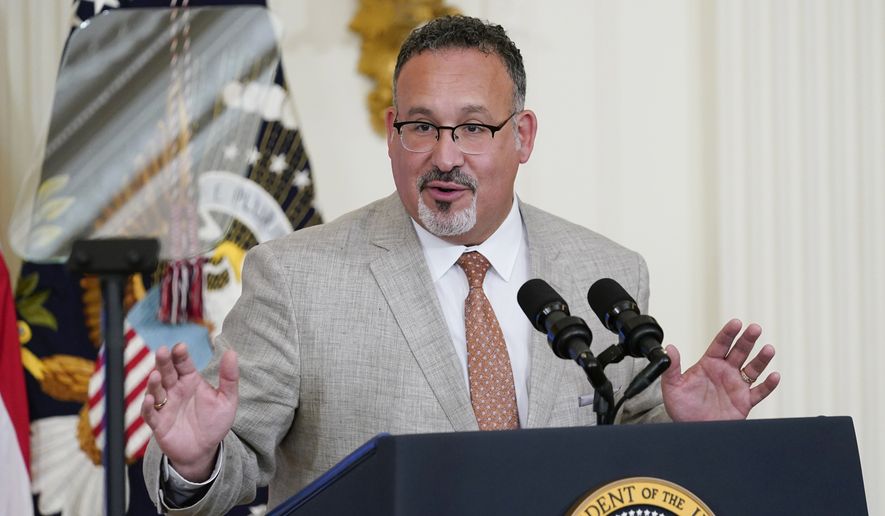Top Republicans expressed strong concerns Wednesday to Education Secretary Miguel Cardona over reports of colleges and universities actively undermining free speech and academic freedom on their campuses.
Republican Reps. James Comer of Kentucky and Virginia Foxx of North Carolina requested an immediate briefing on what actions, if any, the Education Department is taking to adopt an educational environment of tolerance and respect for all opinions.
The two lawmakers — Mr. Comer is the ranking Republican on the Oversight and Reform Committee; Mrs. Foxx holds that position on the Education and Labor Committee — noted that the federal government provides U.S. academic institutions billions in taxpayer-funded grants yearly.
“We are conducting oversight over the U.S. Department of Education’s (the Department) administration of taxpayers’ dollars awarded to public and private colleges and universities under various federal programs. Specifically, we are concerned many of these colleges and universities are undermining free speech and academic freedom on their campuses,” they wrote.
“Despite this problem, the Department does not seem to be engaged in promoting the free exchange of ideas within our colleges and universities,” Mr. Comer and Mrs. Foxx said.
The Education Department had no immediate response to a request for comment from The Washington Times.
Reports of attacks on campus free speech are practically a daily news story, and the lawmakers took note of some in their letter.
They cited how a computer science professor at the University of Washington had been disciplined for refusing to include a divisive “indigenous land acknowledgement” statement on his course syllabi.
In another instance, it took a federal lawsuit for the University of Michigan to disband its “bias response team” which was restricting free speech by seeking out and reporting student conduct that was considered “hostile” or “biased” against specific groups.
The Republicans also criticized the routine shutdown of campus speakers by “disruptive student protesters.”
The lawmakers noted that American taxpayers supply a substantial financial boost to both public and private universities.
In 2019, Yale University received approximately $620 million, Harvard University received approximately $1.1 billion, the University of Pennsylvania received approximately $830 million, Georgetown University received approximately $370 million and the University of Southern California received approximately $1.1 billion.
Public schools also receive significant federal funding.
In 2019, the University of Washington received $1.2 billion, the University of Michigan received $1.1 billion, the University of California Hastings College of the Law received $30 million, and Arizona State University received $1 billion in federal taxpayer money.
Federal funds for 2019 were sent to public and private postsecondary education institutions in the form of federal student aid ($98 billion), grants ($41 billion), and contracts ($10 billion).
Additionally, since 2020, these institutions received $76.2 billion in “emergency” funds in Emergency Relief Fund (HEERF) via the Coronavirus Aid, Relief, and Economic Security Act (CARES Act), the Coronavirus Response and Relief Supplemental Appropriations Act (CRRSAA), and the American Rescue Plan Act (ARPA).
The Republican lawmakers said that for this reason, institutions of higher learning should be sites of open debate and dialogue.
The lawmakers asked Mr. Cardona for a staff-level briefing by Oct. 5 on how the department’s administration of funds for higher education is promoting free speech and academic freedom.
“The proliferation of cancel culture in American higher education threatens the ability of students and faculty to push themselves past their academic limits,” they wrote to Mr. Cardona. “The Department should be signaling to these institutions that academic freedom is paramount for the success of students, faculty, and society, and should help them see that limiting free speech is counter to the intellectual goals of academia.”
• Kerry Picket can be reached at kpicket@washingtontimes.com.




Please read our comment policy before commenting.